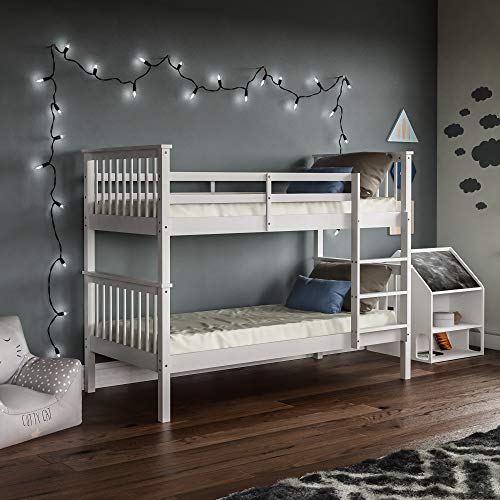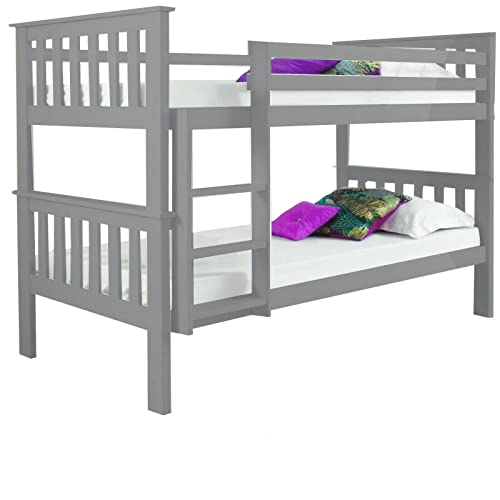Bunk Single Beds Tools To Ease Your Everyday Lifethe Only Bunk Single …
Page Information

Content
 Bunk Single Beds
Bunk Single BedsBunk beds can make a significant impact on children's bedrooms. They can help keep their room clean, neat and organized by providing them a space to store books, toys as well as other things.
They also can create a crowded, less private room. You can overcome this by selecting furniture that has design flexibility.
Size
Bunk beds are an efficient method of putting multiple people in a single bunk bed with mattress room. However, selecting the right size is essential for safety and comfort. To prevent mobility issues the bed's dimensions should be in line with the room's size and ceiling height. The side rails of the bunk bed need to be high enough to accommodate mattresses and should attach firmly to the frame.
Bunk single beds are typically smaller than standard single bed sizes, but are still suitable for adult use. This lets you pick a mattress that is appropriate for your body type and sleep needs. A mattress that is thinner is typically preferred by children who sleep on the top bunk as it is simpler to get in and out.
There are a few options for the size of the mattress on a bunkbed, such as twin over futon and twin over full. These two configurations are ideal for parents who have children of different ages. Twin over full bunk bed has queen-sized mattress at the top and a full size mattress on the bottom. This is a popular option for families with children that are at similar ages and heights. Futon bunks come with the standard bunk Single bed bed on top and a futon below that can be used as a couch or even a bed.
You can also pick an XL full size bunkbed which is five inches more than a traditional full mattress. These mattresses are ideal for teens and taller adult single sleepers.
For healthcare facilities that frequently change their patient demographics the bunk single beds can be a practical solution to accommodate different demands for sleep. Whether your facility has a single or bunk bed configuration, it is crucial to check and maintain each unit to ensure they meet the highest standards of comfort and safety.
Bunk beds are a great option for healthcare facilities who need to maximize space in the space of a smaller area. They are durable and offer a great value for your cost, since you can reduce space by removing the requirement for additional furniture pieces. Additionally, bunk beds are an excellent way to promote collaboration between your staff and patients. This will increase the satisfaction of patients and help to improve outcomes.
Style
It is crucial to think about the design of your single or bunk bed, and not just the dimensions. For example, metal bunk beds are an excellent option for establishments that desire to create a more homey style without sacrificing durability or strength. They are also easier to clean than single bunk bed metal bed upholstered.
Single beds are more suited for rehabilitation and long-term care facilities with stable and permanent patient populations. Although they are less cost-effective than bunk beds, they offer the same level of security and comfort and minimize danger of falling from the top bunk.
Another benefit of single beds is that they're generally more streamlined than bunk bed that separates into singles beds. It can be challenging enough to dress a twin bed when it's on the ground, but trying to fit one while hanging from a ladder creates a new level of difficulty! Bunk beds are difficult to climb for children and patients with limited mobility.
Single beds can be styled in a variety ways, which gives the facility manager more flexibility and helps to create a more personalized space for guests. They can also be combined with other furniture pieces to make a room appear more comfortable and inviting. A bunk bed, for instance can be paired with a daybed or desk to maximize the space available.
Ultimately, it's the facility's management to determine which bed configuration is the best suited to their particular needs and the population. Consider the most important factors for your organization in order to make the best choice and find the ideal solution for your patients.
To ensure that your beds are safe and reliable, you should regularly check and maintain the bed. This can reduce the risk of liability and extend their lifespans. Journal of Facility Management states that regular maintenance can reduce repairs costs by 20 percent. Bunk beds and single beds are both excellent choices for furnishing behavioral healthcare facilities however it's crucial to weigh each option against your unique patient demographics and room sizes to determine which will be most suitable for your program.
Safety
If it's the bedroom of a child or a behavioral health facility, bunk single beds offer numerous advantages. They can maximize space and provide more storage space, but they also pose a risk to safety due to their height. Bunk beds require a ladder to get to the bed's upper level. Children might be enticed by the ladder, or climb it. To keep everyone safe, you should teach your children to use the stairs properly and ensure that they are always secured.
Another crucial safety feature of bunk single beds is guard rails, which are crucial to prevent falls. They should be placed at minimum 16cm above the surface of the mattress and their gaps shouldn't be greater than 7.5cm. Refer to the manufacturer's guidelines for more details about how to install your guardrails, and ensure they meet the safety standards.
Bunk bed safety is dependent on the appropriate bedding. Make sure that the mattress you choose to use is in compliance with safety standards and fit comfortably on the frame. You should also regularly clean the mattress and its support system to minimize the chance of entrapment and injury.
The ladders and stairs must be a safe option to access the top bunk. They should be constructed with a strong foundation to avoid accidents. They should be at an appropriate angle to avoid climbing over or under the guardrails. They should also have handrails that are easy to hold. Toys and other clutter should be cleared away so that children are not attracted to climb them.
Finally, you must be aware of the cleaning challenges that bunk beds can cause and implement regular hygiene protocols to ensure hygiene is maintained at a high level. According to a study published in Infection Control Today published in 2010 cleaning bunk beds can take as much as 20 percent more time than cleaning single beds. By following these guidelines you can reduce the risks associated with bunk beds and ensure your patients are in the most comfortable and pleasant environment.
Convenience
Bunk single beds provide an ideal solution for facility managers to meet the efficiency of space, safety for patients and comfort requirements. They are available in various sizes to accommodate different patients. Their simple design makes them simple for facility managers to keep clean and maintain.
Improved Safety Single beds are more stable than bunk beds and require fewer structural components which reduces the risk of falling - a core issue in healthcare facilities. Their simple design and low profile make them easier to reach for personnel, reducing the risk of injuries.
Effectively using vertical space in rooms is a vital consideration in many human services and behavioral healthcare environments, where floor space is in short supply. Bunk single beds allow facilities to accommodate a higher number of people in the same space. This can lead to cost-savings. This is particularly useful for high-density building or small areas with little floor space.
The beds are designed to provide the most flexibility in a space as they can easily be separated into two individual single beds when a child is old enough or no longer requires sharing the room. These beds are great for families who are anticipating changes to their children's sleeping habits. They can also reduce clutter and provide more storage space.
The lower platform can be transformed into a futon during daytime, maximizing the space in a bedroom or apartment. Additionally, some frames are designed in an L-shape, so that the lower bed can function as a sofa while a mattress rests on top, allowing for additional flexibility and convenience. bunk bed two singles beds can also come with integrated storage options to ensure the room remains tidy and organized. Bunk single beds are typically more expensive than traditional single beds, however they're cost-efficient in the long term due to reduced maintenance costs and extended durations. They are also simple to disassemble and assemble which makes them perfect for quick rearranging and relocations. This feature is important for facilities that reorganize rooms regularly to meet changes in patient demographics or clinical demands. The beds are simple to clean and disinfect, which makes it easier to maintain efficient methods of controlling infections.

- PreviousYou'll Never Guess This Private Psychiatrist Sheffield Cost's Secrets 24.10.26
- NextWhy Mental Assessments Is Everywhere This Year 24.10.26
Comment list
There are no registered comments.
